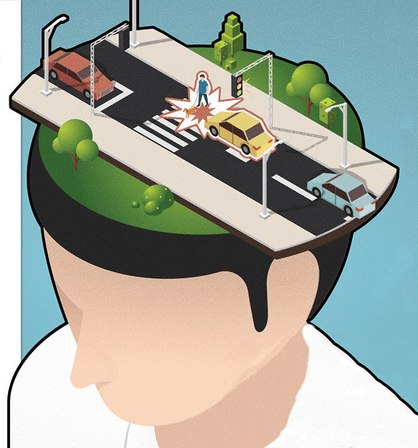Pedal Love will host a briefing on Wednesday to discuss recommendations from a report on how media influences the way people think about and talk about street safety, safety improvements, and enforcement. It turns out that seemingly small word choices made by journalists, editors, and police reporting on crashes changes the way people understand them.
Streetsblog and others have been writing about this issue for years. Using the word "accident" to describe traffic crashes, for example, tends to absolve drivers of responsibility in a crash. Recent research confirms that journalist reports on traffic crashes leads readers to place blame on the most vulnerable party--the person biking or walking--and leave drivers' actions unquestioned.
The authors of the recent study, Tara Goddard at Texas A&M University, Kelcie Ralph and Evan Iacobucci at Rutgers University, and Calvin Thigpen, formerly of Arizona State University, found that media reports also affect people's perception of what safety measures work. For example, after a crash, police and media both tend to warn pedestrians to "make eye contact" and "wear bright colors," but less often warn drivers to slow down and pay better attention.
The study recommends that journalists - and others who discuss crashes - recognize their role in this. That is, using "more precise language that avoids victim-blaming or pre-emptively absolving the driver" can affect how people think about the causes of crashes and what can be done about them. Providing context, such as the history of crashes at the collision location or a visual of dangerous or difficult conditions, can shift support for traffic calming strategies.
The webinar is meant to help educate and inform journalists, but also advocates, public agency workers, and anyone else who frames and discusses traffic violence.
"I'm not confident that the Sacramento Bee, for example, is suddenly going to write stories that are thirty percent longer just to cover extra details," Jim Brown of Pedal Love told Streetsblog. "But an advocate can supply those details," which can help shape the context for a story.
Brown was talking about his work for Sacramento Area Bike Advocates, where he tried to make sure journalists he worked with had as much information as possible. He also did what he could to make it easier for journalists to talk about traffic dangers without much effort on their part. "If I could locate an interview on a dangerous street, for example, that would give them visuals, and give me a talking point. There was a way in which I was educating the media, not just being a good interview but raising their understanding of the subject."
In this first short (half-hour) webinar, report authors Tara Goddard and Kelcie Ralph will introduce the study, discuss its findings, and answer questions. In April, Pedal Love plans to host another more in-depth webinar aimed at helping advocates apply the research findings in their work.
"The report tells advocates that their media game really matters," said Brown. "We really need to make sure media understand our point of view."
The webinar has been seeing a lot of nationwide interest from advocates. It will take place at 11 am Wednesday, March 11.






